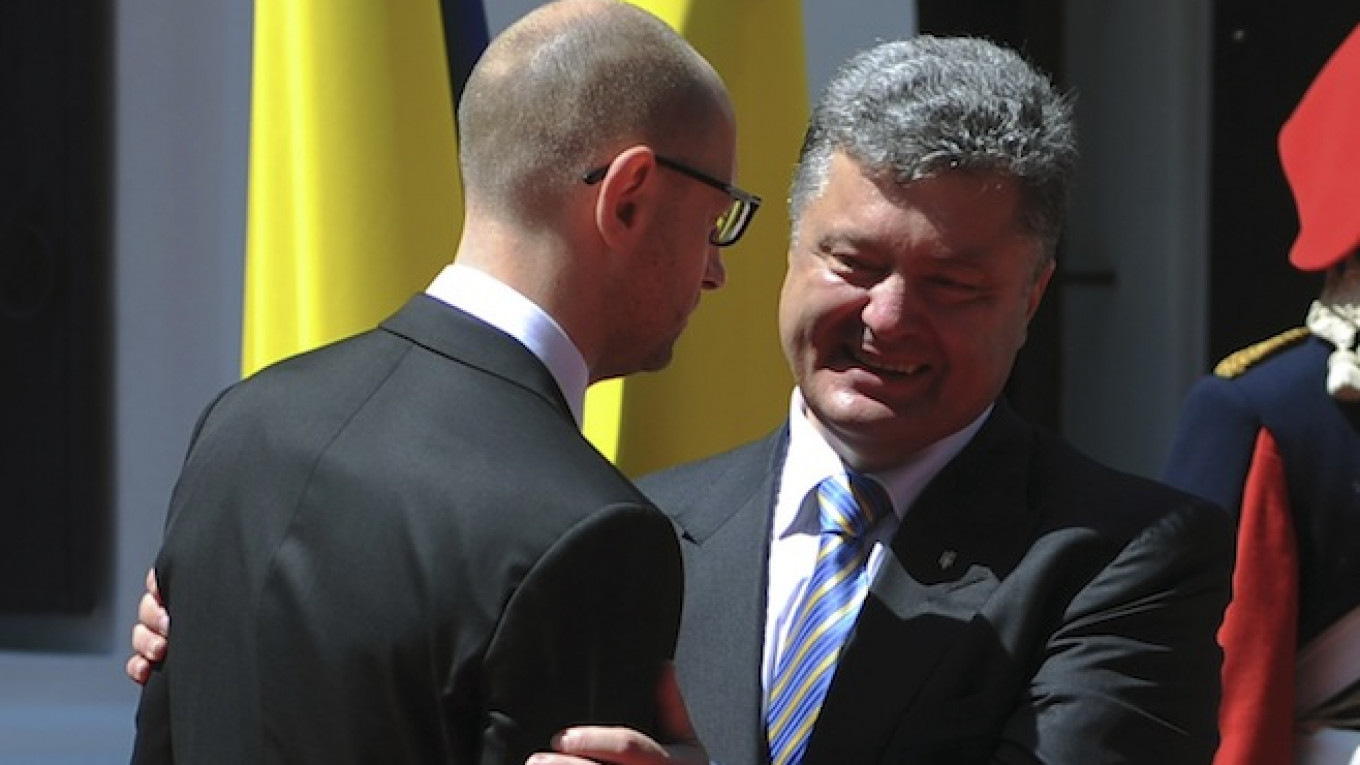Ukraine is holding "preliminary" talks with creditors on a possible restructuring of its foreign currency debts, an official from an international finance association said following recent meetings with Ukrainian officials.
The discussions underscore the severity of Ukraine's financial woes even after receiving $27 billion in loans from the International Monetary Fund and nations including the U.S. The loans are aimed at propping up Ukraine as it reforms its economy and struggles with an armed rebellion.
Lubomir Mitov, an economist with the Institute of International Finance who recently visited Ukraine, said Thursday that it was too soon to say whether the country would need to change the terms of its debt. He said Ukrainian officials stressed they would avoid forcing any so-called haircuts on bondholders.
"The Ukrainian authorities made very clear to us that they would consider this only as a really, truly voluntary operation agreed by the bondholders," Mitov told journalists by phone. "A voluntary exchange or maturity extension could be one of the sources for financing."
"We know they are having some preliminary discussions between the authorities and bondholders, but they are still very preliminary," Mitov said.
The IIF is a financial industry lobby group that represents many of the world's biggest banks. It took the lead representing bondholders in discussions over restructuring Greek debt.
Ukraine's economy is under severe pressure as the country struggles with what Russian President Vladimir Putin has described as a civil war. Ukrainian President Petro Poroshenko, who took office on June 7, is pushing a peace plan to end the rebellion in eastern Ukraine, where pro-Russian militants are fighting for secession from the country.
Russia cut off natural gas supplies to Ukraine this week in a dispute over $1.95 billion in unpaid bills and failure to agree on the price of future gas deliveries.
Mitov said Ukraine was already in a deep recession that could shrink its gross domestic product, a measure of total economic output, by from 8 percent to 10 percent.
Still, he said Ukraine's finances will not be poor enough to necessitate a debt restructuring deal until at least next year. And even then, Kiev might not need a restructuring if it is able to return to capital markets to raise money, Mitov said.
"Nothing is decided yet," he said.
For now, Ukraine is relying on the billions of dollars in official funding from institutions and countries to help pay its debts, including those owed to Russia.
An IMF official reaffirmed the fund's view that Ukraine is unlikely to require a debt restructuring.
The price of Ukraine's 2017 dollar bond fell sharply following Mitov's comments, according to Reuters data. "The mention of 'restructuring' is causing people to reduce exposure," said Tim Ash at Standard Bank in a client note.
See also:
IMF Throws Ukraine $17 Billion Loan Lifeline But Pledges Caution
A Message from The Moscow Times:
Dear readers,
We are facing unprecedented challenges. Russia's Prosecutor General's Office has designated The Moscow Times as an "undesirable" organization, criminalizing our work and putting our staff at risk of prosecution. This follows our earlier unjust labeling as a "foreign agent."
These actions are direct attempts to silence independent journalism in Russia. The authorities claim our work "discredits the decisions of the Russian leadership." We see things differently: we strive to provide accurate, unbiased reporting on Russia.
We, the journalists of The Moscow Times, refuse to be silenced. But to continue our work, we need your help.
Your support, no matter how small, makes a world of difference. If you can, please support us monthly starting from just $2. It's quick to set up, and every contribution makes a significant impact.
By supporting The Moscow Times, you're defending open, independent journalism in the face of repression. Thank you for standing with us.
Remind me later.






